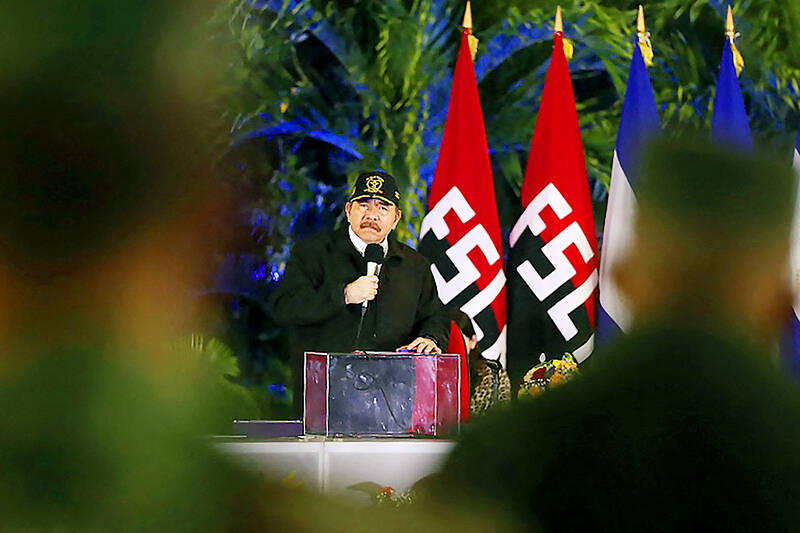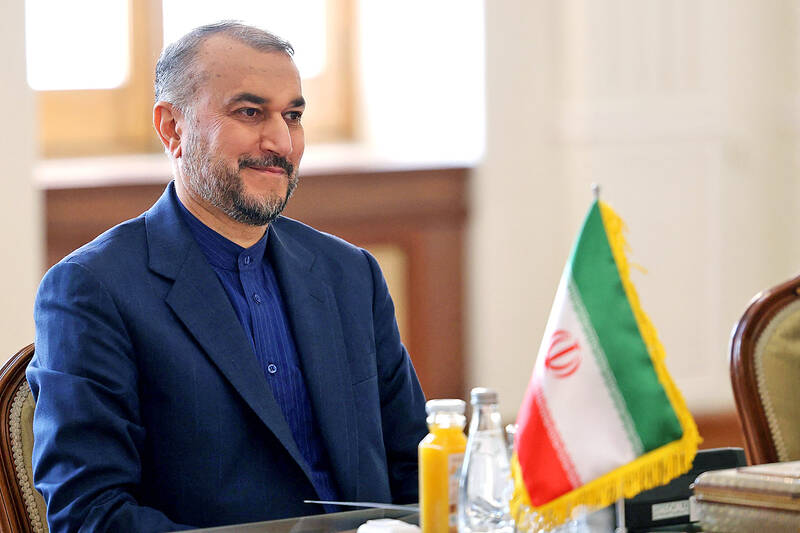Nicaraguan President Daniel Ortega on Thursday defended the right of Iran and North Korea to develop nuclear weapons, saying the US holds no authority to turn them back.
Ortega made the remarks upon receiving Iranian Minister of Foreign Affairs Hossein Amir-Abdollahian.
“We don’t love atomic bombs ... but what authority [do Western powers have] to want to prohibit Iran if it wants to make atomic bombs?” Ortega asked with the Iranian minister by his side.

Photo: AFP / NICARAGUAN PRESIDENCY / JAIRO CAJINA
He added that North Korea has the same sovereign right no matter how the US or its allies feel about it.
Western powers “don’t have the right to dictate who has and who doesn’t have atomic bombs,” Ortega said, adding that he personally would like “all atomic bombs to disappear, starting with the ones of the Yankees.”
Amir-Abdollahian thanked Ortega for his statement and said Tehran’s nuclear program has only peaceful aims — an assertion disputed by the US and other Western allies that signed an accord with Iran in 2015 to dismantle much of its nuclear program.

Photo: AFP
The US withdrew from the Iran accord in 2018.
Earlier in the day, the Iranian foreign minister told the Nicaraguan National Assembly that Iran and Nicaragua “have a lot in common, many similarities.”
The countries, which are both subject to US sanctions, on Wednesday evening signed a memorandum of understanding for greater cooperation.
Amir-Abdollahian, who began his visit on Wednesday, is scheduled to head to Venezuela next, the Iranian Ministry of Foreign Affairs said.
Amir-Abdollahian said Ortega and Iranian President Ebrahim Raisi have committed to taking steps to implement a bilateral agreement signed at the end of last year.
In December, Amir-Abdollahian and Nicaraguan Minister of Foreign Affairs Denis Moncada signed an agreement in Tehran that included energy issues, although no details were shared.
On Wednesday evening, the two countries additionally signed a memorandum of understanding “for cultural, scientific, health cooperation, cooperation also in the political field and cooperation in all spheres of common good,” said Nicaraguan Vice President Rosario Murillo, who is Ortega’s wife.
Iran also maintains strong ties with Venezuela and Cuba, which are likewise subject to US-led international sanctions and have been widely criticized for their authoritarian regimes.
An increasingly authoritarian president, Ortega has clamped down on human rights organizations in his country and the Catholic Church, which he accused of supporting 2018 protests against the government.
However, Ortega on Thursday offered support to ongoing mass protests in Peru, saying that ousted Peruvian president Pedro Castillo should be freed from prison and reinstated.

Asian perspectives of the US have shifted from a country once perceived as a force of “moral legitimacy” to something akin to “a landlord seeking rent,” Singaporean Minister for Defence Ng Eng Hen (黃永宏) said on the sidelines of an international security meeting. Ng said in a round-table discussion at the Munich Security Conference in Germany that assumptions undertaken in the years after the end of World War II have fundamentally changed. One example is that from the time of former US president John F. Kennedy’s inaugural address more than 60 years ago, the image of the US was of a country

BLIND COST CUTTING: A DOGE push to lay off 2,000 energy department workers resulted in hundreds of staff at a nuclear security agency being fired — then ‘unfired’ US President Donald Trump’s administration has halted the firings of hundreds of federal employees who were tasked with working on the nation’s nuclear weapons programs, in an about-face that has left workers confused and experts cautioning that the Department of Government Efficiency’s (DOGE’s) blind cost cutting would put communities at risk. Three US officials who spoke to The Associated Press said up to 350 employees at the National Nuclear Security Administration (NNSA) were abruptly laid off late on Thursday, with some losing access to e-mail before they’d learned they were fired, only to try to enter their offices on Friday morning

Cook Islands officials yesterday said they had discussed seabed minerals research with China as the small Pacific island mulls deep-sea mining of its waters. The self-governing country of 17,000 people — a former colony of close partner New Zealand — has licensed three companies to explore the seabed for nodules rich in metals such as nickel and cobalt, which are used in electric vehicle (EV) batteries. Despite issuing the five-year exploration licenses in 2022, the Cook Islands government said it would not decide whether to harvest the potato-sized nodules until it has assessed environmental and other impacts. Cook Islands Prime Minister Mark Brown

STEADFAST DART: The six-week exercise, which involves about 10,000 troops from nine nations, focuses on rapid deployment scenarios and multidomain operations NATO is testing its ability to rapidly deploy across eastern Europe — without direct US assistance — as Washington shifts its approach toward European defense and the war in Ukraine. The six-week Steadfast Dart 2025 exercises across Bulgaria, Romania and Greece are taking place as Russia’s invasion of Ukraine approaches the three-year mark. They involve about 10,000 troops from nine nations and represent the largest NATO operation planned this year. The US absence from the exercises comes as European nations scramble to build greater military self-sufficiency over their concerns about the commitment of US President Donald Trump’s administration to common defense and